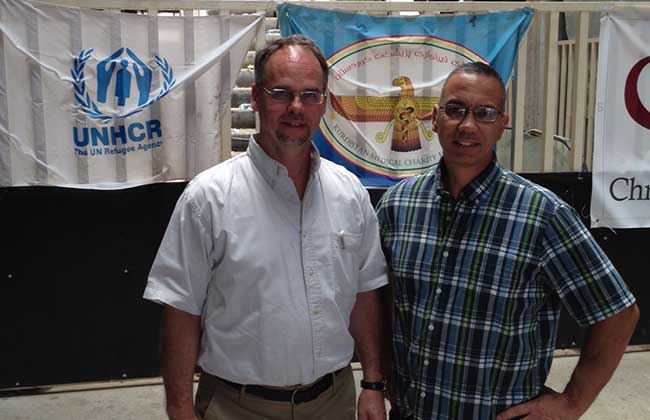An invitation to visit to Iraq made Ron Opmeer nervous. He prepared himself for the worst. But once he arrived, he was amazed.
By Ron Opmeer
Following the call of Jesus is not always comfortable
Without warning, the pastor’s wife received a frantic phone call: “Leave the city now!” On the other end of the line was a parishioner living on the west side of the Tigris River in Mosul, Iraq. It was June 2014.
Mrs. Abu, as I’ll call her, served an evangelical church with her aging husband. The congregation just happened to be gathering for a Bible study on the east side of the river when ISIS showed up. Mrs. Abu and the others left in a hurry. Recalling their departure, Mrs. Abu’s eyes widened as she described how the highway became a 12-lane parking lot dotted by red taillights on their slow drive northeast to the Kurdish provincial capital of Erbil.
When Jesus said, “Come follow me,” he wasn’t calling his disciples to play it safe. So I had a hard decision to make when a friend invited me to join him on a trip to Iraq in April with Samaritan’s Purse, an organization that offers spiritual and physical aid to people around the world,
“Ron, you’re going to regret the day you met me!” my friend said.
When I learned that my travel insurance premiums would exceed the cost of my flights and that the insurance included coverage for body repatriation, dismemberment, and K & R (insurance lingo for “kidnap and ransom”), I realized this trip was nothing like the R & R variety I am usually drawn to. Writing letters to each of my children in case I didn’t return almost broke my resolve to go. But in the end, my sacrifice paled in comparison to the Iraqi Christians I met who have followed Jesus “through many dangers, toils and snares,” as the old hymn says—leaving behind homes, businesses, friends, and churches.
“Wake up, o sleeper,” Paul writes in his letter to the Ephesians, and “[make] the most of every opportunity, because the days are evil” (Ephesians 5:14, 16, NIV). My trip was a wake-up call to the plight of persecuted believers in the Middle East who, like Mrs. Abu, are some of the giants of our faith today.
Another giant is 10-year-old Myriam, who forgave ISIS in an interview on Arabic Christian TV. By the time I visited the unfinished mall where she lived in Erbil, the YouTube video had more than a million hits.
Other giants include the Samaritan’s Purse staff who meet the practical needs of thousands of Yazidi refugees who escaped the siege of Mount Sinjar last August. The Yazidis are particularly grateful as they are viewed by many as modern-day Samaritans, despised for their religious mix of Zoroastrianism, Islam, and Christianity.
When I looked into their sun-baked faces and into their eyes, which had seen unspeakable atrocities, I prayed that they would meet the “despised and rejected” Saviour who has brought us peace (Isaiah 53:3). That’s why Samaritan’s Purse is there, and that’s why I went. But above all, that is why many persecuted Iraqi Christians are determined to stay.
I went to Iraq to visit “the least of these brothers and sisters of mine” (Matthew 25:40, NIV), but came home having met some of the greatest.
Ron Opmeer is pastor of Bethel Reformed Church in Abbotsford, British Columbia, and president of Classis British Columbia.





